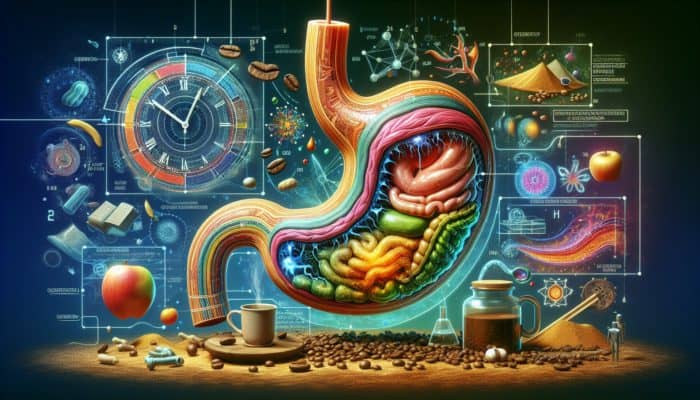Enhancing Digestive Wellness: The Importance of Caffeine Timing in Relation to Meals
What Effect Does Caffeine Have on the Digestive Process?

Gaining a comprehensive understanding of the intricate relationship between caffeine and its timing with meals is essential for optimising the digestive process. Caffeine significantly stimulates gastric acid production, which is vital for breaking down food effectively. However, the influence of caffeine on digestion can vary greatly depending on the timing of its consumption in relation to meals. The primary effects of caffeine on the digestive system include:
- Increased gastric acid secretion: When caffeine is consumed, the stomach responds by generating more acid, which can greatly accelerate the digestion process.
- Enhanced gastric motility: Caffeine aids in the swift movement of food through the digestive tract, potentially reducing the time required to process meals.
- Possible digestive discomfort: For some individuals, consuming caffeine on an empty stomach may result in irritation or discomfort.
- Effects on appetite: Caffeine has the potential to temporarily suppress appetite, which can affect meal timing and portion sizes.
- Influence on gut flora: Caffeine may alter the composition of gut microbiota, thereby impacting overall digestive health.
- Stimulation of bile production: Caffeine encourages the liver to produce bile, which is crucial for the digestion of fats.
Consequently, the timing of caffeine consumption can profoundly influence digestion, either enhancing or complicating the process depending on individual tolerance levels and dietary habits.
How Quickly Is Caffeine Absorbed Into the Body?
The rate at which caffeine is absorbed into the bloodstream is affected by various factors, including the presence of food in the stomach. When caffeine is consumed alongside meals, its absorption may be delayed as the body prioritises the digestion of food. On average, caffeine peaks in concentration in the bloodstream within 30 to 60 minutes after consumption, though this timeframe can extend when food is present.
What Influence Does Caffeine Have on Nutrient Absorption?
The interaction between caffeine and various nutrients can significantly alter their absorption rates, which is vital for maintaining overall health. Certain vitamins and minerals, notably calcium, iron, and magnesium, may experience reduced absorption if ingested simultaneously with caffeine. This interaction is particularly crucial for individuals with specific dietary requirements or those managing conditions such as osteoporosis or anemia. By strategically timing caffeine intake around meals rich in these nutrients, individuals can help maximise their benefits while minimising potential absorption challenges.
Identifying the Best Times for Caffeine Consumption

To fully exploit the advantages of caffeine, it is critical to understand individual metabolic rates and circadian rhythms. Research indicates that consuming caffeine during mid-morning or early afternoon provides optimal energy boosts without disrupting nighttime sleep patterns. For those engaged in physical activities or mentally demanding tasks, consuming caffeine approximately 30 to 60 minutes prior can enhance performance, leading to improved focus and increased stamina.
Insights from Experts on Caffeine Consumption Timing with Meals
What Are the Most Effective Times for Caffeine Consumption?
The most beneficial times to consume caffeine generally align with natural fluctuations in energy levels throughout the day. Experts typically suggest enjoying coffee or other caffeinated beverages during late morning or early afternoon when cortisol levels tend to dip, thereby better regulating alertness. Aligning caffeine intake with meals can further enhance alertness and sustain energy levels, making mid-morning snacks or lunchtime ideal opportunities for a caffeine boost.
When planning caffeine consumption, consider the following recommendations:
– Mid-morning (9 AM – 11 AM): Perfect for overcoming post-breakfast fatigue.
– Post-lunch (1 PM – 3 PM): Effective for combating the midday slump.
– Before exercise (30-60 minutes prior): Significantly enhances physical performance.
– During work breaks: Helps maintain focus and motivation.
How Can Timing Caffeine Enhance Performance?

Strategically timing caffeine intake can result in substantial improvements in both physical and mental performance for athletes. Consuming caffeine before workouts can boost endurance and strength by increasing the availability of fatty acids as a fuel source. For professionals, taking caffeine around important work tasks sharpens focus and enhances productivity. To maximise these benefits, individuals should experiment with timing to discover what aligns best with their personal routines.
Consider practical strategies such as:
– Scheduled consumption: Align caffeine intake with workout sessions or critical tasks throughout the day.
– Monitoring effects: Keep track of personal productivity levels in relation to caffeine consumption.
– Avoiding overlap with mealtimes: This strategy can prevent digestive discomfort and enhance nutrient absorption.
What Techniques Do Experts Recommend for Syncing Caffeine with Meals?
Experts advocate specific techniques for synchronising caffeine intake with meals to amplify its benefits. One effective approach is to consume caffeine approximately 30 minutes before meals or during breaks to minimise digestive issues and enhance alertness. Additionally, individuals are encouraged to opt for lighter meals when consuming caffeine, as heavier meals may slow absorption and lessen the intended effects.
Real-world examples demonstrate how both athletes and professionals benefit from strategic caffeine timing. For instance, a runner might enjoy coffee before a race breakfast to enhance performance, while a software developer may sip espresso during mid-morning meetings to maintain alertness.
Health Considerations Related to Caffeine Timing
How Does Caffeine Affect Blood Sugar Levels?
Caffeine can influence blood sugar levels, particularly when consumed with meals. For individuals managing diabetes or experiencing insulin sensitivity, understanding how caffeine affects insulin response or causes fluctuations in blood sugar levels is critical. Research suggests that caffeine can induce an acute rise in glucose levels, necessitating careful monitoring to prevent spikes.
To mitigate these effects, individuals might consider consuming caffeine alongside high-fibre meals that help stabilise blood sugar levels. Furthermore, timing caffeine around physical activity can further balance glucose responses, creating a synergistic effect.
What Risks Are Associated with Poor Caffeine Timing?
Inadequate timing of caffeine intake can lead to numerous negative consequences, including heightened anxiety, disrupted sleep patterns, and digestive discomfort. Common pitfalls include consuming caffeine too late in the day, which may result in insomnia, or ingesting caffeine on an empty stomach, exacerbating jitters and gastric distress.
Individuals should remain mindful of their tolerances and habits, steering clear of late afternoon or evening caffeine to ensure restful sleep and maintain a regular digestive rhythm. Moreover, it is essential to listen to one’s body and adjust consumption based on personal experiences.
What Should You Understand About Caffeine and Hydration?
The diuretic properties of caffeine can significantly influence hydration levels, especially when consumed with meals. This is particularly crucial in warmer climates or for individuals engaged in intense physical activities. To maintain optimal hydration, it is vital to pair caffeine consumption with adequate water intake.
Strategies to ensure proper hydration include:
– Drinking water alongside caffeinated beverages: This helps counteract caffeine's diuretic effects.
– Choosing lower-caffeine options: Opting for teas or lighter coffee blends can reduce caffeine intake while maintaining hydration.
– Monitoring fluid intake: Adopt a balanced approach to hydration throughout the day.
How Does Caffeine Timing Influence Athletic Performance?
Carefully timing caffeine consumption before exercise can significantly affect performance outcomes. Consuming caffeine approximately 30 to 60 minutes before workouts can elevate energy levels and decrease perceived exertion, leading to enhanced physical capabilities. However, poor timing, such as consuming caffeine too close to exercise, may result in jitters or gastrointestinal issues.
To optimise performance, athletes should consider testing their caffeine responses during training sessions rather than on competition day. Additionally, pairing caffeine with carbohydrates can enhance energy efficiency, yielding improved performance and recovery.
What is the Connection Between Caffeine Timing and Sleep Quality?
Ingesting caffeine too close to bedtime can severely disrupt sleep quality. The half-life of caffeine ranges from 3 to 7 hours; therefore, late-day caffeine consumption can lead to sleep disturbances and reduced overall restfulness. Understanding individual sensitivity to caffeine is crucial, as some individuals metabolise it more slowly than others.
To promote better sleep quality, it is advisable to avoid caffeine at least 6 hours before bedtime. Establishing a caffeine cutoff time can help ensure uninterrupted sleep cycles, facilitating restorative rest and enhancing overall health.
Investigating the Link Between Caffeine Timing and Sleep Quality
How Does the Timing of Caffeine Consumption Affect Sleep Quality?
The timing of caffeine intake is closely associated with sleep quality. Consuming caffeine too near bedtime can hinder the ability to fall asleep and negatively impact overall sleep quality. This relationship is particularly significant for individuals sensitive to caffeine, who may encounter disrupted sleep cycles if they consume it in the late afternoon or evening.
By being mindful of when caffeine is consumed during the day, individuals can greatly enhance their sleep quality. Most experts recommend avoiding caffeine at least 6 hours prior to planned sleep to ensure that its stimulating effects do not interfere with the natural sleep cycle.
What is Caffeine’s Half-Life and Its Implications for Sleep?
Understanding caffeine's half-life is crucial for determining the best times to consume it concerning sleep. On average, caffeine has a half-life of approximately 3 to 5 hours, meaning that half of the caffeine consumed is eliminated from the body within this timeframe. However, this can vary significantly among individuals due to factors such as age, hormonal changes, and overall health.
To enhance sleep quality, it is advisable to monitor personal caffeine consumption and its effects on sleep. Establishing a personal cutoff time based on individual metabolism can help ensure that caffeine does not linger in the system too close to bedtime, thereby minimising the risk of sleep disturbances.
What Strategies Can Improve Sleep Quality While Using Caffeine?
Implementing specific timing strategies can help mitigate caffeine's negative effects on sleep. By being strategic about caffeine intake, individuals can enjoy its benefits without compromising sleep quality. Here are some practical suggestions:
– Monitor caffeine consumption throughout the day: Keeping a log can help identify patterns and sensitivities.
– Set a daily cutoff time for caffeine: Establishing a clear time after which caffeine is avoided can promote better sleep hygiene.
– Opt for caffeine-free alternatives in the evening: Choosing herbal teas or decaffeinated versions of favourite beverages can help maintain routines without the stimulating effects of caffeine.
– Experiment with timing: Adjusting caffeine intake to find the optimal window for personal energy levels and sleep patterns can enhance overall well-being.
Research-Backed Advantages of Timing Caffeine with Meals
What Cognitive Benefits Are Associated with Caffeine Timing?
Proper timing of caffeine can yield significant cognitive enhancements, such as improved memory, attention span, and reaction times. Research indicates that individuals who consume caffeine strategically during periods of peak cognitive demand experience enhanced focus and mental clarity. This timing aligns with natural fluctuations in alertness throughout the day, making caffeine a powerful cognitive enhancer when utilised effectively.
To leverage these benefits, individuals should consider integrating caffeine into their routines during high-demand periods, such as studying or tackling complex tasks. Experimenting with different timings can further refine personal productivity strategies.
How Can Caffeine Timing Influence Weight Management?
Timing caffeine intake with meals can positively impact metabolism and appetite, potentially supporting weight management efforts. Studies indicate that caffeine can elevate metabolic rates and enhance fat oxidation, especially when consumed before meals. This effect can be particularly advantageous for individuals aiming to manage their weight.
To effectively utilise caffeine within weight management strategies, individuals may experiment with consuming caffeine before meals to suppress hunger signals and boost energy expenditure. Pairing caffeine with a balanced diet and regular physical activity can amplify these effects.
What Are the Long-Term Health Benefits of Proper Caffeine Timing?
Long-term consumption of caffeine, particularly when timed appropriately with meals, can offer various health benefits, including a reduced risk of certain diseases such as Parkinson's disease and <a href="https://limitsofstrategy.com/type-2-diabetes-in-men-essential-treatment-strategies/">type 2 diabetes</a>. Research suggests that regular caffeine intake can positively influence metabolic health and potentially enhance life expectancy when incorporated into a balanced lifestyle.
To maximise these long-term health benefits, individuals should focus on incorporating caffeine in a way that complements their overall dietary habits, ensuring it enhances rather than replaces healthier options.
How Does Strategic Caffeine Timing Improve Athletic Performance?
Timing caffeine consumption in conjunction with meals can greatly enhance athletic performance, particularly in endurance-based activities. Research has shown that caffeine can boost both endurance and strength by increasing adrenaline levels and mobilising fatty acids from fat tissues, providing athletes with a vital energy source.
For athletes, caffeine intake should be coordinated with their training and competition schedules to maximise performance-enhancing benefits. This includes taking caffeine before workouts to improve endurance or cognitive sharpness during competitions.
Practical Strategies for Timing Caffeine with Meals
How to Optimise Daily Routines Using Caffeine Timing?
Incorporating caffeine into daily routines can be optimised by considering meal times. Strategically planning caffeine consumption around meals enhances alertness when it is most needed while minimising potential digestive issues. For busy individuals, this means scheduling caffeine consumption to coincide with energy dips throughout the day.
Practical tips for optimising caffeine timing include:
– Establishing a morning routine: Incorporate caffeine with breakfast to kickstart the day.
– Using caffeine as a reward during breaks: Enjoying a cup of coffee during breaks can provide a psychological boost.
– Planning pre-workout caffeine intake: Align consumption with workout schedules for maximum performance benefits.
What Foods Enhance the Effects of Caffeine?
Certain foods can enhance or mitigate the effects of caffeine when consumed together. Pairing caffeine with specific foods can optimise energy levels and improve the overall experience. Some effective food pairings include:
- Dark chocolate: Rich in antioxidants, dark chocolate complements the stimulating effects of caffeine.
- Oatmeal: A high-fibre breakfast item that stabilises blood sugar levels while providing caffeine.
- Greek yogurt: Provides protein and probiotics that support digestion alongside caffeine.
- Nuts: Healthy fats can alleviate jitters when consumed with caffeine, providing a stable energy release.
- Bananas: Rich in potassium and natural sugars, they enhance caffeine’s effects.
These food pairings not only enhance the enjoyment of caffeine but also support overall health and well-being.
How to Adjust Caffeine Intake for Different Meals?
Modifying caffeine consumption according to the type of meal can lead to improved outcomes regarding both energy levels and digestive comfort. For breakfast, lighter caffeinated beverages may work best, while lunch might pair well with more substantial options.
Strategies for timing caffeine with different meals include:
– Breakfast: Pairing coffee with high-fibre foods to stabilise energy levels.
– Lunch: Considering moderate caffeine intake to combat post-lunch fatigue.
– Dinner: Avoiding caffeine close to mealtime to prevent potential sleep disruptions.
By tailoring caffeine intake to meal types, individuals can effectively manage energy levels and avoid unintended side effects.
Boosting Productivity Through Caffeine Timing
How Can Strategic Caffeine Timing Enhance Productivity?
Strategically timing caffeine intake can significantly boost productivity by aligning consumption with natural energy cycles. Consuming caffeine during peak focus times increases the likelihood of enhanced alertness, improved concentration, and greater output.
To optimise work performance, consider:
– Timing caffeine for peak productivity periods: Aligning consumption with important tasks or meetings can create a powerful boost in focus.
– Balancing caffeine with breaks: Taking breaks after caffeine consumption can maximise sustained energy levels, creating a positive feedback loop in productivity.
What Are the Best Caffeine Timing Strategies for Different Work Schedules?
Different work schedules may require tailored approaches to caffeine timing. Understanding when to consume caffeine can greatly influence performance and alertness throughout the day. Here are some strategies for various work patterns:
- Standard 9-5 jobs: Mid-morning and post-lunch are optimal times for caffeine breaks.
- Shift work: For night shifts, strategic caffeine consumption before shifts can help maintain alertness.
- Freelancers: Experiment with personal peak hours to optimise focus, allowing for flexible caffeine timing.
- Students: Align caffeine intake with study sessions for improved concentration and retention.
Adapting caffeine consumption to work schedules can lead to increased focus and productivity in diverse environments.
How to Balance Caffeine Intake with Breaks for Maximum Efficiency?
Balancing caffeine intake with regular breaks is crucial for sustaining productivity levels. Over-reliance on caffeine without breaks can lead to burnout and diminishing returns.
To optimise productivity:
– Integrate short breaks: Taking regular breaks during extended tasks can enhance focus and rejuvenate energy levels.
– Time breaks with caffeine intake: Consuming caffeine before breaks can maximise the energy boost and motivation when returning to work.
– Listen to your body: Adjust your break schedule and caffeine intake based on energy levels to maintain consistent productivity.
By striking a balance between caffeine consumption and breaks, individuals can enhance their work output and maintain high productivity levels throughout the day.
Exploring the Social and Cultural Dimensions of Caffeine Timing
How Do Social Interactions Impact Caffeine Timing?
Caffeine consumption plays a pivotal role in social interactions and gatherings. The timing of caffeine consumption can significantly influence the experience and dynamics of social events, whether at a café, during a meal, or at a celebration.
When attending social gatherings, consider:
– Conversations over coffee: Timing coffee breaks can enhance social interactions, allowing for relaxed conversations.
– Meal pairings: Offering caffeine-rich beverages during meals can create enjoyable dining experiences.
– Cultural traditions: In many cultures, coffee breaks are integral to fostering connections, making timing crucial for social cohesion.
Being mindful of caffeine timing in social settings can enhance both the enjoyment of the event and the quality of interactions.
What Cultural Practices Surround Caffeine Timing?
Various cultures exhibit distinct practices regarding caffeine consumption and timing, which significantly influence meal timing and overall caffeine intake. For instance, in Italy, espresso is often consumed after meals, while in many Asian cultures, tea is enjoyed throughout the day.
These cultural nuances affect when and how caffeine is consumed:
– Ceremonial practices: In countries like Japan, traditional tea ceremonies highlight the importance of timing and experience in caffeine consumption.
– Social norms: In cultures where coffee is a staple, meeting for coffee may be a conventional part of social life, influencing meal schedules.
– Health beliefs: Different cultural attitudes toward caffeine—whether viewed as a stimulant or a health benefit—can shape global consumption patterns.
Understanding these cultural differences can enrich one’s experience with caffeine and highlight its role in social bonding and connection.
How to Adjust Caffeine Timing for Special Occasions?
Special occasions often necessitate adjustments to caffeine timing to accommodate different meal schedules and social activities. Whether it’s a wedding, holiday gathering, or celebration, being flexible with caffeine intake can enhance enjoyment and comfort.
For special occasions:
– Pre-event planning: Consider caffeine intake based on the timing of meals and festivities to prevent discomfort.
– Social cues: Adjust caffeine consumption based on the flow of the event, ensuring that energy levels align with social interactions.
– Pairing with celebrations: Use caffeine creatively in celebratory beverages, ensuring that its timing complements the overall experience.
By adjusting caffeine timing to suit special occasions, individuals can enjoy the benefits of caffeine while enriching their social experiences.
Common Inquiries Regarding Caffeine Timing
What is the most effective time of day for caffeine consumption?
The optimal time to consume caffeine is generally during mid-morning or early afternoon, aligning with the natural energy dips that occur throughout the day. This timing can elevate alertness and productivity without compromising sleep.
Can caffeine impact nutrient absorption?
Yes, caffeine can affect the absorption of certain nutrients, such as calcium and iron. Consuming caffeine alongside meals rich in these nutrients may reduce the effectiveness of their absorption.
How long does caffeine remain in the system?
Caffeine has an average half-life of approximately 3 to 5 hours, indicating that it takes the body roughly 3 to 5 hours to eliminate half of the consumed caffeine. Individual metabolism can cause this duration to fluctuate.
Is it harmful to drink coffee on an empty stomach?
Drinking coffee on an empty stomach may increase gastric acid production, potentially leading to discomfort or digestive issues for some individuals. It is advisable to pair coffee with food for a more balanced effect.
What foods should I avoid combining with caffeine?
Foods high in calcium or iron may interact with caffeine, potentially hindering absorption. It’s recommended to avoid consuming large quantities of these nutrients simultaneously with caffeine.
How can I improve my athletic performance using caffeine?
To enhance athletic performance, consume caffeine approximately 30-60 minutes before workouts. This can boost endurance and focus during physical activity.
Does caffeine influence sleep quality?
Yes, consuming caffeine too close to bedtime can disrupt sleep patterns and reduce the quality of rest. It is best to avoid caffeine at least 6 hours before sleep.
Can I adjust my caffeine intake according to the type of meal?
Yes, adjusting caffeine intake according to meal types can yield improved outcomes. For instance, lighter meals may pair well with moderate caffeine intake, while heavier meals might warrant a lower intake.
What cognitive benefits are associated with caffeine?
Caffeine can enhance cognitive functions, including attention, memory, and reaction times. Strategic timing of caffeine can maximise these cognitive benefits during high-demand tasks.
How does caffeine affect blood sugar levels?
Caffeine consumption can impact blood sugar levels, causing fluctuations that may be particularly significant for individuals with diabetes or insulin resistance. Careful timing of meals can help manage these effects.
Connect with us on Facebook!
The Article Timing Caffeine With Meals: Optimize Your Day appeared first on https://athleticsupplement.com
The Article Optimize Your Day: Timing Caffeine With Meals Was Found On https://limitsofstrategy.com


The exploration of caffeine’s timing in relation to meals is intriguing and highlights the often-overlooked complexities of our digestive health. I have experienced firsthand how the timing of caffeine consumption can influence not just my digestion but also my overall well-being. For example, I noticed that having coffee right after a meal sometimes leads to discomfort, whereas waiting about an hour or so allows for a much smoother digestive experience.
It’s interesting how our bodies respond uniquely to things like caffeine, isn’t it? Your experience really highlights the importance of being mindful about when we consume certain foods and drinks, especially with something as common as coffee. I’ve noticed similar patterns myself—having caffeine too close to a meal can definitely throw off my digestion. For me, it sometimes feels like the body is trying to decide whether to focus on digesting food or processing the caffeine, which can lead to that uncomfortable feeling.